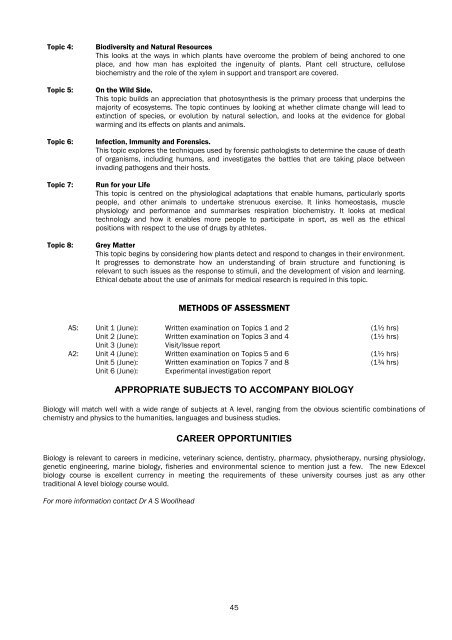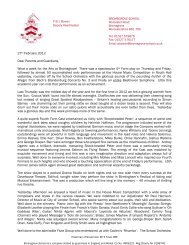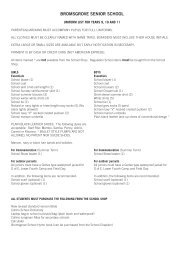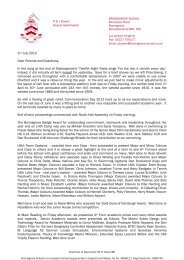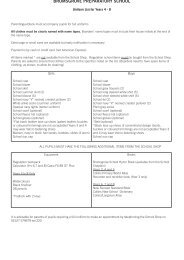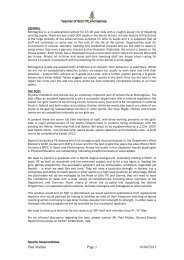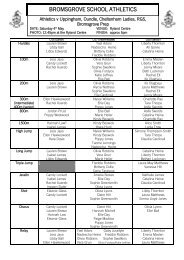Sixth Form Course Booklet 2013 - Bromsgrove School
Sixth Form Course Booklet 2013 - Bromsgrove School
Sixth Form Course Booklet 2013 - Bromsgrove School
You also want an ePaper? Increase the reach of your titles
YUMPU automatically turns print PDFs into web optimized ePapers that Google loves.
Topic 4:<br />
Topic 5:<br />
Topic 6:<br />
Topic 7:<br />
Topic 8:<br />
Biodiversity and Natural Resources<br />
This looks at the ways in which plants have overcome the problem of being anchored to one<br />
place, and how man has exploited the ingenuity of plants. Plant cell structure, cellulose<br />
biochemistry and the role of the xylem in support and transport are covered.<br />
On the Wild Side.<br />
This topic builds an appreciation that photosynthesis is the primary process that underpins the<br />
majority of ecosystems. The topic continues by looking at whether climate change will lead to<br />
extinction of species, or evolution by natural selection, and looks at the evidence for global<br />
warming and its effects on plants and animals.<br />
Infection, Immunity and Forensics.<br />
This topic explores the techniques used by forensic pathologists to determine the cause of death<br />
of organisms, including humans, and investigates the battles that are taking place between<br />
invading pathogens and their hosts.<br />
Run for your Life<br />
This topic is centred on the physiological adaptations that enable humans, particularly sports<br />
people, and other animals to undertake strenuous exercise. It links homeostasis, muscle<br />
physiology and performance and summarises respiration biochemistry. It looks at medical<br />
technology and how it enables more people to participate in sport, as well as the ethical<br />
positions with respect to the use of drugs by athletes.<br />
Grey Matter<br />
This topic begins by considering how plants detect and respond to changes in their environment.<br />
It progresses to demonstrate how an understanding of brain structure and functioning is<br />
relevant to such issues as the response to stimuli, and the development of vision and learning.<br />
Ethical debate about the use of animals for medical research is required in this topic.<br />
METHODS OF ASSESSMENT<br />
AS: Unit 1 (June): Written examination on Topics 1 and 2 (1½ hrs)<br />
Unit 2 (June): Written examination on Topics 3 and 4 (1½ hrs)<br />
Unit 3 (June): Visit/Issue report<br />
A2: Unit 4 (June): Written examination on Topics 5 and 6 (1½ hrs)<br />
Unit 5 (June): Written examination on Topics 7 and 8 (1¾ hrs)<br />
Unit 6 (June): Experimental investigation report<br />
APPROPRIATE SUBJECTS TO ACCOMPANY BIOLOGY<br />
Biology will match well with a wide range of subjects at A level, ranging from the obvious scientific combinations of<br />
chemistry and physics to the humanities, languages and business studies.<br />
CAREER OPPORTUNITIES<br />
Biology is relevant to careers in medicine, veterinary science, dentistry, pharmacy, physiotherapy, nursing physiology,<br />
genetic engineering, marine biology, fisheries and environmental science to mention just a few. The new Edexcel<br />
biology course is excellent currency in meeting the requirements of these university courses just as any other<br />
traditional A level biology course would.<br />
For more information contact Dr A S Woollhead<br />
45


